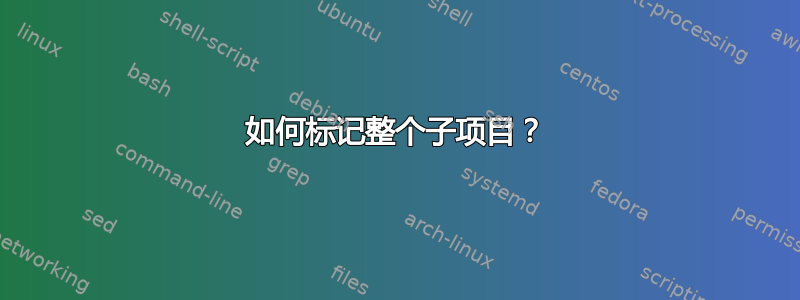
我正在输入一个需要子项的文档(例如:1. a)、b)等)。我已经能够通过使用来执行此操作,\subitem但真正让我烦恼的是,只有子项的第一行有缩进(制表符),而后面的内容不符合该缩进。这有意义吗?以下是我所说的图片,以防万一:

我尝试使用\setlength{\parindent}{0.25cm},但没有用。我正在使用枚举项包,但我还没有仔细研究过,所以也许有些东西我还没有尝试过。如果有人能对如何解决这个有点烦人的问题提出建议,我将不胜感激。提前谢谢!
编辑我正在使用的代码(其中的一部分):
\item \textit{CC DD} and \textit{cc dd} individuals were crossed to each other, and the $\mathrm{F_{1}}$ generation was backcrossed to the \textit{cc dd} parent. 903 \textit{Cc Dd}, 897 \textit{cc dd}, 98 \textit{Cc dd}, and 102 \textit{cc Dd} offspring resulted.
\subitem a. How far apart are the \textit{c} and \textit{d} loci?
\subitem b. What progeny and in what frequencies would you expect to result from testcrossing the $\mathrm{F_{1}}$ generation from a \textit{CC dd} X \textit{cc DD} cross to \textit{cc dd}?
答案1
只需将一个enumerate环境嵌入另一个环境即可:
\documentclass{article}
\usepackage{lipsum} % just for some dummy text
\usepackage{enumitem}
\setenumerate[2]{label=\alph*.}
\begin{document}
\begin{enumerate}
\item
\begin{enumerate}
\item \lipsum[1]
\item \lipsum[2]
\end{enumerate}
\item \lipsum[3]
\end{enumerate}
\end{document}
答案2
嵌套itemize也有效。
\begin{itemize}
\item item-1
\item item-2
\begin{itemize}
\item item-2-1
\item item-2-2
\end{itemize}
\item item-3
\end{itemize}


